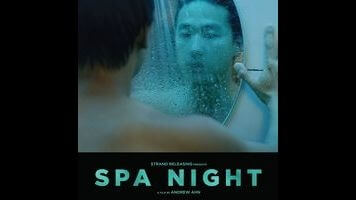American independent cinema has long been a viable venue for the children of immigrants to tell their stories, and Andrew Ahn’s first feature, Spa Night, is no exception. A muted melodrama with a keen understanding of subtle social divides, the film follows one young first-generation Korean-American as he takes his first tentative steps outside the confines of his close-knit family, and discovers secrets about his parents and his own community. Though it leaves too many narrative blanks unfilled, Spa Night is a promising debut from a filmmaker with a lot of insight into the different guises that immigrants and their offspring wear as they make their way through the world.
Joe Seo stars as David Cho, an 18-year-old Los Angeleno living in Koreatown with his father, Jin (Youn Ho Cho), and mother, Soyoung (Haerry Kim). David’s parents own a failing restaurant, which makes them particularly anxious about their son’s future plans—wondering if he’s going to go to college or when he might find a nice Korean girl and settle down. When he floats the possibility that maybe he’ll marry a white woman someday, they’re unamused. (“How will we communicate with her?” his non-English-speaking mom asks.) That’s how David knows that he can’t tell his traditionalist, churchgoing folks the real truth about why he has no apparent relationships or goals. It’s because he’s gay, and is still figuring out how to balance being himself and being the son he thinks his parents deserve.
Or at least that seems to be what’s up with David. Ahn saddles himself with a lead who hardly ever talks, and then points the camera directly at him for most of the movie, encouraging the audience to speculate on what might be going through David’s head. Though Seo’s a magnetic young actor, too much about his character is left to the imagination. Does he have any hobbies? What are his long-term intentions? Why is he so unprepared for life after high school? Ahn spends a lot of time giving the older Chos a personality and backstory—detailing their disappointments, their weaknesses, and their embarrassment over their financial struggles—but David remains something of a mystery throughout Spa Night. That obliqueness, coupled with a slow-developing plot and an elliptical ending, makes the film at times feel like it’s trying too hard to be elusive and poetic.
But while Spa Night takes too long even to get around to its titular premise, which has to do with David taking a job at a bathhouse that turns out to be a gay cruising spot, it still works well throughout as a collection of well-observed moments. Ahn is especially attuned to the Cho family’s wavering status within their own social circle, as they go from respected business owners to people who can barely afford to give a friend’s child a birthday gift. Some of the movie’s best scenes involve Soyoung, who swallows her pride and gets hired on as a waitress, working for another Korean woman whose son, Eddie, is a USC student—everything David’s not, in other words. The boozy Jin has trouble getting back on his feet, and criticizes his son for being a burden. But Soyoung perseveres.
That ends up being much of what Spa Night is about: David looking around for role models in Eddie, Jin, Soyoung, and the men on the make in his bathhouse. Skewed just a little differently, this movie could’ve been sensationalistic, exploring the erotic thrill a shy, young gay man feels as he stumbles into the sexy oasis that he never knew existed in his neighborhood. But the anonymous pleasures of the steam room aren’t really what David’s looking for either. Though it’s a shade too vague, Spa Night does a fine job of articulating the existential ennui of someone who loves his parents but knows he can never be what they were expecting. At its best, the film illustrates what it’s like to be bound every day by someone else’s perceptions.










![Rob Reiner's son booked for murder amid homicide investigation [Updated]](https://img.pastemagazine.com/wp-content/avuploads/2025/12/15131025/MixCollage-15-Dec-2025-01-10-PM-9121.jpg)

























![HBO teases new Euphoria, Larry David, and much more in 2026 sizzle reel [Updated]](https://img.pastemagazine.com/wp-content/avuploads/2025/12/12100344/MixCollage-12-Dec-2025-09-56-AM-9137.jpg)




